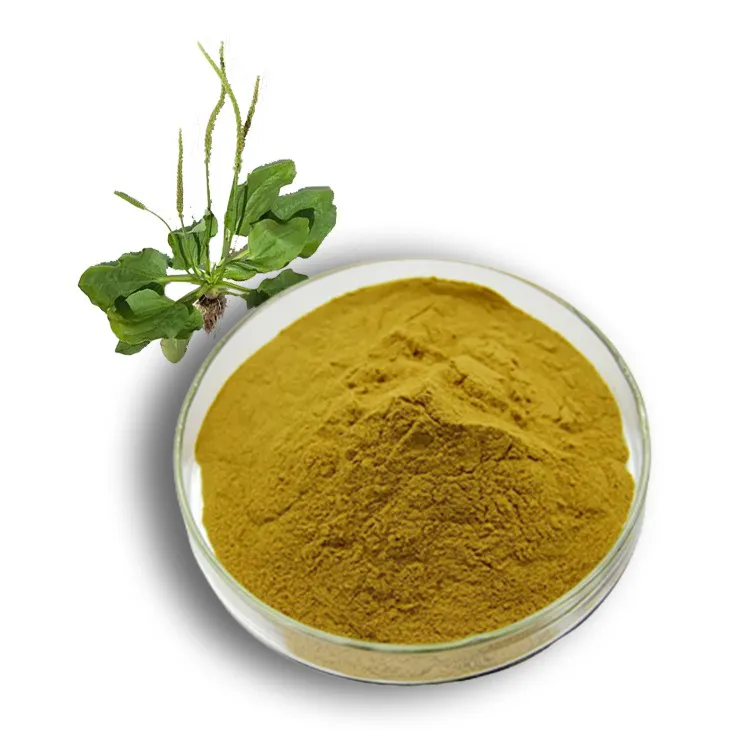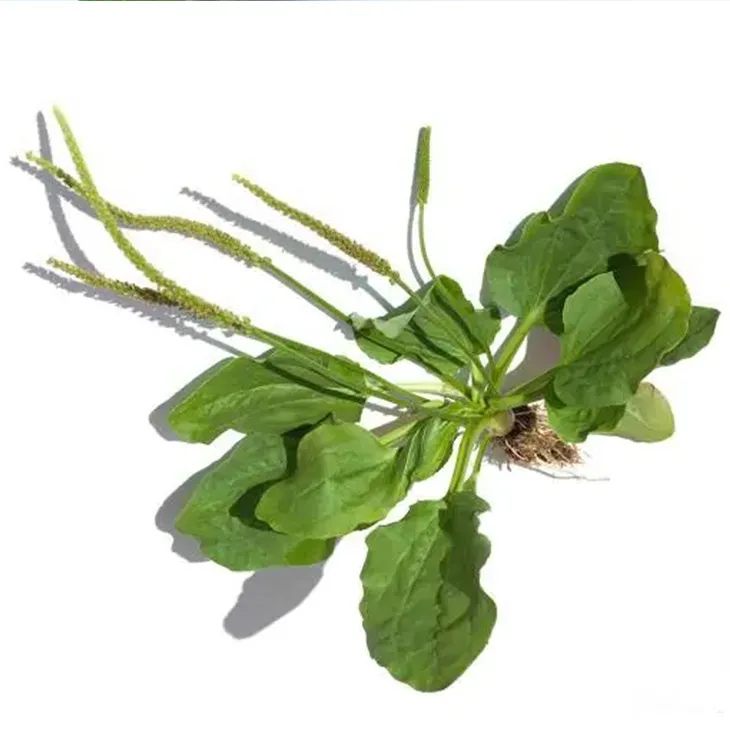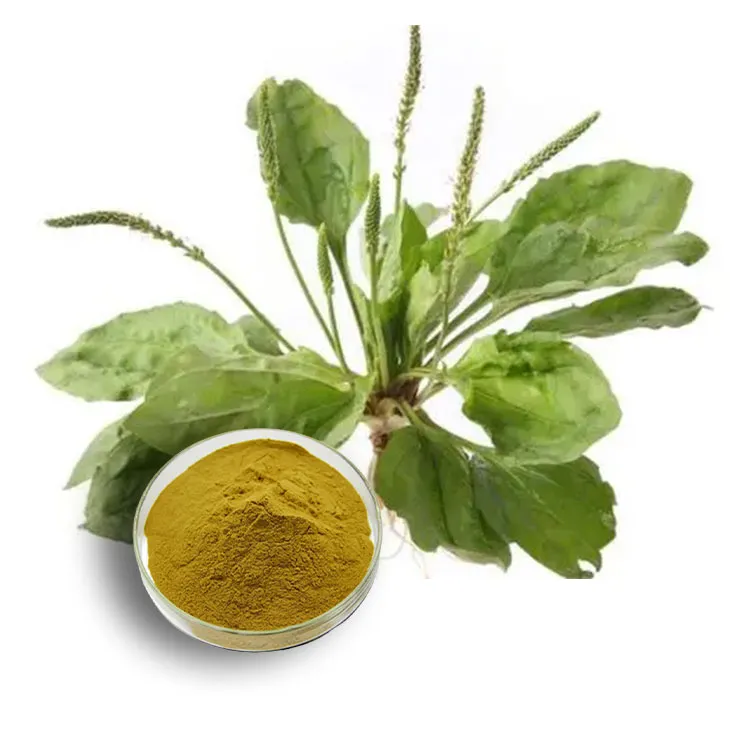- 0086-571-85302990
- sales@greenskybio.com
Components of fertilizers and feeds in plantain extracts.
2024-11-28

1. Introduction
The plantain, a common plant found in many regions around the world, has been gaining attention in the agricultural sector for its potential use in fertilizers and animal feeds. Plantain extract offers a range of unique properties that make it a multi - functional and sustainable ingredient in these applications. This article will explore the various aspects of Plantain extract, including its nutrient content, growth - promoting factors for plants, and nutritional benefits for livestock.

2. Nutrient Content in Plantain extract
Plantain extract is rich in a variety of nutrients that are beneficial for both plants and animals. One of the key nutrients present in plantain extract is potassium. Potassium is an essential macronutrient for plants, playing a crucial role in processes such as photosynthesis, water regulation, and enzyme activation. In animal nutrition, potassium is also important for maintaining proper muscle function, nerve transmission, and fluid balance.
Additionally, plantain extract contains significant amounts of calcium. Calcium is vital for plant cell wall structure and development, as well as for various physiological processes in animals, including bone formation and blood clotting. Magnesium is another nutrient found in plantain extract. It is involved in chlorophyll synthesis in plants and in numerous enzymatic reactions in animals.
The extract also contains micronutrients such as iron, zinc, and manganese. Iron is necessary for plant respiration and nitrogen fixation, and in animals, it is crucial for oxygen transport in the blood. Zinc plays a role in plant growth regulation and in animal immune function, while manganese is involved in plant photosynthesis and antioxidant defense in animals.

3. Growth - Promoting Factors for Plants in Plantain Extract
3.1. Hormonal Regulation
Plantain extract contains natural plant hormones or substances that can mimic hormonal actions. For example, it may contain auxins, which are hormones responsible for cell elongation, root development, and apical dominance in plants. These auxins in plantain extract can stimulate root growth, which in turn helps plants to better absorb water and nutrients from the soil.
3.2. Enhanced Nutrient Uptake
The presence of certain compounds in plantain extract can enhance the uptake of nutrients by plants. For instance, some organic acids in the extract can chelate soil minerals, making them more available for plant uptake. This improved nutrient availability can lead to increased plant growth, better yields, and stronger resistance to environmental stresses.
3.3. Biostimulant Properties
Plantain extract acts as a biostimulant, which means it can boost plant growth and development in various ways even without directly providing large amounts of nutrients. It can enhance the plant's natural defense mechanisms against pests and diseases, for example, by activating the plant's immune system. This can reduce the need for chemical pesticides in agricultural practices, making it a more environmentally friendly option.

4. Nutritional Benefits for Livestock in Plantain Extract
4.1. Digestibility and Palatability
For livestock, plantain extract can improve the digestibility of feed. The presence of certain enzymes or enzyme - like substances in the extract can break down complex feed components, making them easier for animals to digest. Moreover, plantain extract has a pleasant taste and smell, which can enhance the palatability of the feed. Animals are more likely to consume feed that tastes good, which can lead to increased feed intake and better growth performance.
4.2. Health - Promoting Effects
The nutrients in plantain extract contribute to the overall health of livestock. As mentioned earlier, the presence of potassium, calcium, and other minerals helps in maintaining proper physiological functions in animals. For example, it can prevent muscle cramps and weakness in animals due to potassium deficiency. The micronutrients in the extract also play a role in enhancing the immune system of livestock, making them more resistant to diseases.
4.3. Anti - Inflammatory and Antimicrobial Properties
Plantain extract has been shown to possess anti - inflammatory and antimicrobial properties. In livestock, these properties can be beneficial in reducing inflammation in the gut, which can improve gut health and nutrient absorption. Additionally, the antimicrobial properties can help in controlling harmful bacteria in the gut, further promoting the health of the animals.
5. Incorporating Plantain Extract into Fertilizers and Feeds
5.1. In Fertilizers
Plantain extract can be incorporated into fertilizers in different ways. It can be used as an additive in traditional chemical fertilizers to enhance their effectiveness. For example, a small amount of plantain extract can be added to a potassium - based fertilizer to provide additional growth - promoting factors. It can also be used as a component in organic fertilizers. In organic farming, plantain extract can be combined with other organic materials such as compost or manure to create a more nutrient - rich and bio - active fertilizer.
5.2. In Feeds
In animal feeds, plantain extract can be added directly to the feed mixture. It can be used in both dry and wet feed formulations. The amount of plantain extract added to the feed depends on the type of livestock, their age, and their nutritional requirements. For young animals, a lower concentration may be sufficient, while for adult animals with higher nutrient demands, a higher amount of plantain extract may be required.
6. Sustainability of Using Plantain Extract
The use of plantain extract in fertilizers and feeds is a sustainable practice. Plantain is a relatively easy to grow plant that can be cultivated in a variety of soil and climate conditions. This means that the source of plantain extract can be locally produced, reducing the need for long - distance transportation of raw materials. Moreover, since plantain extract can enhance the effectiveness of fertilizers and feeds, it can lead to more efficient use of resources in agriculture. For example, plants may require less chemical fertilizers when supplemented with plantain extract, and livestock may need less feed to achieve the same growth performance.
7. Challenges and Future Directions
7.1. Standardization of Production
One of the challenges in using plantain extract in fertilizers and feeds is the lack of standardization in its production. Different extraction methods can result in varying nutrient compositions and levels of active compounds in the extract. To ensure consistent quality, there is a need for standardized production methods and quality control measures.
7.2. Research on Optimal Dosages
Although plantain extract has shown promising results in promoting plant growth and improving livestock nutrition, more research is needed on the optimal dosages for different applications. Determining the right amount of plantain extract to use in fertilizers and feeds for different plant and animal species is crucial for maximizing its benefits while avoiding potential negative effects.
7.3. Expansion of Applications
In the future, there is potential for expanding the applications of plantain extract in agriculture. For example, it could be explored for use in hydroponic systems or in the development of new types of slow - release fertilizers. In animal nutrition, it could be investigated for its potential in improving the quality of animal products such as meat and milk.
8. Conclusion
In conclusion, plantain extract is a valuable component in fertilizers and feeds. Its rich nutrient content, growth - promoting factors for plants, and nutritional benefits for livestock make it a multi - functional ingredient in agricultural applications. The sustainability of using plantain extract further adds to its appeal. However, challenges such as standardization of production and determination of optimal dosages need to be addressed. With further research and development, plantain extract has the potential to play an even more significant role in the future of agriculture.
FAQ:
What are the main components of plantain extract used in fertilizers?
Plantain extract used in fertilizers may contain various components. It often has a range of macronutrients like potassium, which is essential for plant growth and development. It may also include secondary nutrients and micronutrients. Additionally, there could be organic compounds such as flavonoids and phenolic acids. These components can enhance soil fertility, improve nutrient uptake by plants, and contribute to overall plant health.
How does plantain extract promote plant growth in fertilizers?
The plantain extract promotes plant growth in multiple ways. The nutrients present in it, such as potassium, are crucial for processes like photosynthesis, water regulation in plants, and the development of strong stems. The organic compounds in the extract can also act as biostimulants. They may enhance root development, making plants better able to absorb water and nutrients from the soil. Moreover, some components can improve the soil structure, allowing for better aeration and water retention, which are beneficial for plant growth.
What are the nutritional benefits of plantain extract for livestock in feeds?
For livestock, plantain extract in feeds offers several nutritional benefits. It can be a source of vitamins and minerals. Some of the compounds in the extract may have antioxidant properties, which can help improve the health and immune function of livestock. It may also contain fiber - like substances that can aid in digestion. Additionally, certain components might contribute to better meat or milk quality in animals.
Is plantain extract a sustainable ingredient in fertilizers and feeds?
Yes, plantain extract is a relatively sustainable ingredient. Plantains are often abundant and can be grown in a variety of climates and soil conditions. Their cultivation requires relatively less intensive agricultural practices compared to some other crops. In terms of use in fertilizers and feeds, it can reduce the reliance on synthetic and non - renewable resources. Since it is a natural product, its use can also be more environmentally friendly, reducing potential negative impacts on the ecosystem.
How is plantain extract processed for use in fertilizers and feeds?
The processing of plantain extract for use in fertilizers and feeds typically involves several steps. First, the plantain plants are harvested. Then, they may be dried to reduce moisture content. After that, extraction methods are used, which can include solvent extraction or mechanical pressing. The resulting extract is then purified and concentrated if necessary. In the case of fertilizers, it may be formulated with other nutrients and additives. For feeds, it is mixed with other feed ingredients in appropriate proportions.
Related literature
- The Role of Plantain Extracts in Sustainable Agriculture"
- "Plantain Extract: Nutritional Profile and Its Application in Animal Feeds"
- "Components of Plantain Extract and Their Function in Fertilizers"
- ▶ Hesperidin
- ▶ citrus bioflavonoids
- ▶ plant extract
- ▶ lycopene
- ▶ Diosmin
- ▶ Grape seed extract
- ▶ Sea buckthorn Juice Powder
- ▶ Beetroot powder
- ▶ Hops Extract
- ▶ Artichoke Extract
- ▶ Reishi mushroom extract
- ▶ Astaxanthin
- ▶ Green Tea Extract
- ▶ Curcumin Extract
- ▶ Horse Chestnut Extract
- ▶ Other Problems
- ▶ Boswellia Serrata Extract
- ▶ Resveratrol Extract
- ▶ Marigold Extract
- ▶ Grape Leaf Extract
- ▶ blog3
- ▶ blog4
-
How to make powder with peppermint oil?
2024-11-28
-
Organic konjac powder, Australia.
2024-11-28
-
Chinese Cassia Seed Extract Suppliers.
2024-11-28
-
Suppliers of Organic Diosmin Powder.
2024-11-28
-
Hesperidin with the best reviews.
2024-11-28
-
Organic Epimedium Extract Powder Supplier.
2024-11-28
-
Astaxanthin
2024-11-28
-
Red Wine Extract
2024-11-28
-
Ivy Extract
2024-11-28
-
Dandelion Leaf Extract
2024-11-28
-
Cat Claw Extract
2024-11-28
-
Hesperidin
2024-11-28
-
Peppermint Oil
2024-11-28
-
Cocoa Extract
2024-11-28
-
Bilberry Extract
2024-11-28
-
Milk Thistle Extract
2024-11-28





















